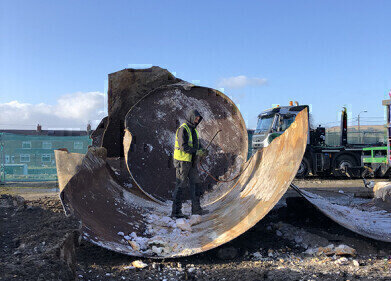Soil Remediation
How Can Farmers Reduce Pollution?
Dec 13 2018
Farming is an industry vital to the assured stability of any country, providing its populace with adequate nutrition and a sizable boost to its economy. However, it can also emit large amounts of greenhouse gases (GHGs) into the atmosphere and cause contamination of soil, air and water if strict controls are not put in place.
The GHGs from agriculture and dairy farming have rightly been the focus of many environmentalists who are concerned about the amount of methane such industries emit, but the problem of fertiliser is equally as serious. In Ireland, where agriculture accounts for 7% of GVA, 9.8% of exports and 8.5% of national employment, new initiatives are being explored to reduce the harmful effects of fertilisers.
Unwanted side-effects
Fertilisers are generally added to soil in order to stimulate growth and boost fertility, with nitrogen and phosphorous two of the most common components in such substances. However, when the former is applied to fields, nitrous oxides (NOx) are released into the air, comprising 33% of Ireland’s agricultural GHG emissions. Meanwhile, both nitrogen and phosphorous can have a devastating effect on waterways, harming the flora and fauna which live in our rivers and seas.
“The basic idea of why we provide fertilisers to soils is that they respond with a big yield increase,” explains soil scientist Dr Paul Murphy. “We deliberately fertilise our soils to boost their fertility, but that nitrogen and phosphorus can be lost from our soils and end up in our rivers, lakes and estuaries. So we’re deliberately fertilising our soils but accidentally fertilising our lakes and rivers.”
Different fertilisers
One suggestion would be to switch to organic farming methods. At present, a mere 2% of Ireland’s farmers employ organic techniques in their operations, and the use of digestate as an organic fertiliser could be one way to circumvent the problems caused by laying nitrogen or phosphorous fertiliser.
However, Dr Murphy is unconvinced about the scale of impact that such a switch would have. “There could be reasons to argue that an organic soil might be more resilient, but I wouldn’t overstate that,” he says. Instead, the good doctor favours an altogether different and potentially much quicker change – the grass itself.
Different grasses
Over 90% of Ireland’s 4.4 million hectares of arable farmland is planted with ryegrass monoculture. Although hardy against the intemperate climate of the Emerald Isle, the strain relies on a sizable amount of nitrogen fertiliser in order to flourish. Replacing this with more malleable strains could enhance yields with less requirement for artificial additives.
University College Dublin (UCD) Lyon Research Farm is conducting an experiment on three different pastures. The first will see the standard nitrogen fertiliser applied to ryegrass, the second with less nitrogen on a ryegrass-and-clover mix and the third with between six and ten species of grass and even less nitrogen. The hope is that the deeper and more complex root networks brought about by different species will encourage water retention and reduce the need for fertiliser.
As yet, the study has not produced tangible results, but going forwards, it could well provide important evidence on how farmers in Ireland and beyond can tailor their habits to reduce their impact on the planet.
Events
May 05 2024 Seville, Spain
May 13 2024 Munich, Germany
May 23 2024 Beijing, China
May 23 2024 Beijing, China
Jun 10 2024 Algiers, Algeria













